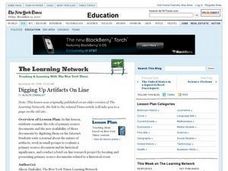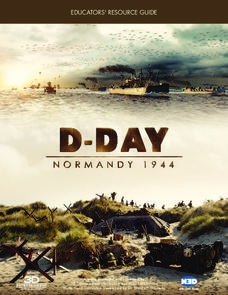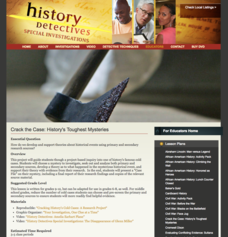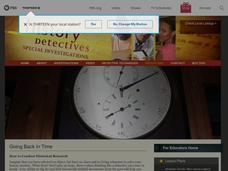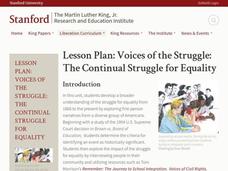Student Handouts
Pivotal Events
This is a simple graphic organizer that allows your class members to chronicle the progress and significance of a series of pivotal events.
Curated OER
Current Event Project
One of the best ways to make history relevant and engaging is to analyze current events before they become history! Check out these project guidelines for a current event research paper, outlining the major required sections of the...
Literacy Design Collaborative
Using Textual Evidence to Analyze Literary Responses to Historical Events
Scholars analyze Animal Farm to learn how to add textual evidence into essays to support their ideas. They search for a deeper meaning to the story and how it relates to the text Totalitarianism and Revolutions in Russia. To finish,...
Curated OER
Digging Up Artifacts On Line
Why is it important to preserve historical documents and artifacts? Examine the role of primary source documents and the availability of these documents on the Internet. Middle and high schoolers write a journal about the nature of...
University of Pennsylvania
From the Dreyfus Affair to the World Today
Historical events do not occur in a vacuum. Such is the case of the Dreyfus Affair, where the connection between Captain Alfred Dreyfus, Emile Zola, and Hannah Arendt is fused by the events of the early 20th century. The informative...
K12 Reader
Two Viewpoints of the Same Event: Lee Surrenders to Grant, 1865
How did Union General Ulysses S. Grant view the surrender of Confederate General Robert E. Lee in 1865, which effectively ended the United States Civil War? After reading an excerpt from Grant's autobiography, your young historians will...
D-Day Normandy 1944
D-Day Normandy 1944
No study of World War II would be complete without an in-depth examination of the events of June 6, 1944. Pascal Vuong's D-Day Normandy:1944, is the perfect vehicle to convey the sheer magnitude of the events that have been called the...
Newseum
From the Front Page to the History Books
Young journalists compare news coverage of four major events with how the same events are covered in historical accounts. The ensuing discussion asks class members to compare and contrast the role of a reporter and the role of a historian.
PBS
1000 Words
A picture really can speak a thousand words—no matter how old! Scholars become history detectives as they learn how to analyze historical photos and evidence to uncover the past. The fun hands-on activity makes history come alive through...
Newseum
Before and After: Analyzing Turning Points in History
Scholars examine front-page news stories to gather evidence about significant historical events. They hypothesize how these events changed people's lives who lived through them and how they continue to impact lives today.
PBS
Women's History: Parading Through History
Want to teach your pupils about debate, effective speech techniques, propaganda, and the women's movement? The first in a sequential series of three, scholars analyze real propaganda images from the the historic women's movement, view a...
PBS
Before We Travel, We Research
Context is key when it comes to historical research. Prior to field research, class members learn as much as they can about the site they are going to visit. Groups investigate and prepare presentations about the history of the site, the...
PBS
Crack the Case: History's Toughest Mysteries
Young sleuths don their trench coats, tip their fedoras, and grab their notepads to investigate one of four famous unsolved mysteries. After examining multiple primary and secondary sources related to their cold case, they propose a...
K20 LEARN
Voices from the Past: History and Literature
Art can enhance the understanding of history. That's the big idea in a lesson that has young scholars read Randall Jarrell's poem "The Death of the Ball Turret Gunner" and an excerpt from John Hersey's Hiroshima, which provide a...
Polk Bros Foundation
I Can Analyze a Story or History Completely and Carefully
Start off analysis of a text with a worksheet that asks pupils to complete several tasks. Class members note down a couple of characters or people and their distinguishing traits, describe the most important event, summarize the text...
Curated OER
Socratic Seminar on Martin Luther King, Jr.’s Letter From Birmingham Jail
Key in the struggle to gain the rights of democratic citizenship was the April 1963 arrest of Dr. Martin Luther King, Jr. for civil disobedience. To deepen their knowledge and understanding of events during the civil rights movement,...
US Holocaust Museum
Time Capsule in a Milk Can
Imagine dumping out a milk can and finding letters from one of the darkest moments in history! Scholars use Holocaust Reading Passages and research to discover how people recorded and hid history during the events of World War II. They...
Smithsonian Institution
Mary Henry: Journal/Diary Writing
A great way to connect social studies with language arts, a resource on Mary Henry's historical diary reinforces the concepts of primary and secondary sources. It comes with an easy-to-understand lesson plan, as well as the reference...
PBS
Going Back In Time
History detectives eschew that time machine and follow the paper trail to go back in time to investigate an unfamiliar object. The goal is for class members to develop their skills as historical detectives.
PBS
March on Washington: A Time for Change
Young historians conclude their study of the events that lead up to and the planning for the March on Washington. After examining videos and primary source documents, they consider the civil rights objectives that still need to be...
Benjamin Franklin Tercentenary
From Ben’s Pen to Our Lives
What would Ben do? Jumping off from the pseudonymous letters Ben Franklin fooled his older brother into publishing when he was still a teenager, young literary lovers dive into acting, writing, and addressing a local issue with wit and...
Stanford University
Voices of the Struggle: The Continual Struggle for Equality
As part of a study of the Civil Rights Movement from 1868 to the present, class members examine first person narratives, the Supreme Court case Brown v. Board of Education, and other significant events in civil rights history. They then...
Weebly
Holocaust Diary Project
Here is a good interdisciplinary project that combines creative and narrative writing with studies of the Holocaust. Your young historians will compose a diary of experiences from the perspective of an individual living during the time...
National Endowment for the Humanities
Revolution '67, Lesson 2: What Happened in July 1967? How Do We Know?
Even in a world in which dozens of participants and curious onlookers record every controversial event, the basic facts of what happened are often in dispute. Revolution '67, Lesson 2 explores 1967 Newark, New Jersey using an examination...
Other popular searches
- Historical Events in Fiction
- Community Historical Events
- 1970's Historical Events
- Historical Events Reading
- Historical Events and People
- Australian Historical Events
- 1990's Us Historical Events
- Historical Events 1500 1750
- 1970s Historical Events





